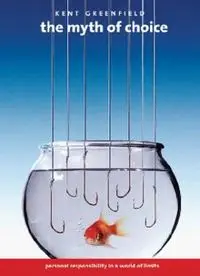
The Myth of Choice: Personal Responsibility in a World of Limits PDF
Preview The Myth of Choice: Personal Responsibility in a World of Limits
The Myth of Choice This page intentionally left blank The Myth of Choice Personal Responsibility in a World of Limits Kent Greenf eld New Haven and London Published with assistance from the Louis Stern Memorial Fund. Copyright © 2011 by Kent Greenf eld. All rights reserved. This book may not be reproduced, in whole or in part, including illustrations, in any form (beyond that copying permitted by Sections 107 and 108 of the U.S. Copyright Law and except by reviewers for the public press), without written permission from the publishers. Epigraph on p. vi: Isaac Bashevis Singer, as quoted in S tefan Kanfer, “Isaac Singer’s Promised City,” City Journal, Summer 1997 (available at http://www.city-journal.org). Yale University Press books may be purchased in quantity for educational, business, or promotional use. For information, please e-mail For Dana We have to believe in free will; we have no choice. —Isaac Bashevis Singer Contents Introduction 1 part 1: the centrality of choice 1. Choices, Choices, Choices 7 2. In Love with Choice 26 part 11: limits and influences 3. Our Choices, Our Brains 47 4. Choice and Culture 70 5. Choice and Power 98 6. Choice and the Free Market 119 part 111: what to do 7. The Problem with Personal Responsibility 143 8. Umpires, Judges, and Bad Choices 163 9. Building Choice in a World of Limits 185 Acknowledgments 207 Notes 209 Credits 231 Index 233 vii This page intentionally left blank Introduction Most of us, most of the time, like to think we are in control of our lives. We are the masters of our own fate. We make our own decisions. In the words of the cheesy poster that hung on my bedroom wall during high school, we “follow our own star.” Whether politically liberal or conservative, we balk at government limitations on choice and f ght those limits with legal arguments about rights and political rhetoric about freedom. Liberals demand access to abortions, want to be able to purchase “medical” marijuana, and don’t appreciate being patted down to get on a plane. Conservatives don’t like requirements to buy health insurance or pay taxes, bristle at limits on gun ownership and school prayer, and decry government regulation of every- thing from food to the environment. If you’re on the left, you’re called a civil libertarian; if you’re on the right, you may call yourself a Tea Partier. Civil libertarians want the government out of their bedrooms; Tea Par- tiers want the government out of their wallets. Liberals and conservatives may disagree about the specif cs of what they want to be free to choose, but both sides believe that Choice is Good. And of course they are both correct that freedom and individual decision making need to be protected, applauded, and engendered. But there are a couple of big problems with this f xation on choice. The f rst is that we face a host of choices that we’re unsure should “count” as choices. Examples abound. If your boss gives you a choice between losing your job and sleeping with him, that is not a choice that merits deference. In fact, he ’s not allowed to give you that choice at all. But it hasn’t been this way for long. As we know from watching Mad Men, 1
